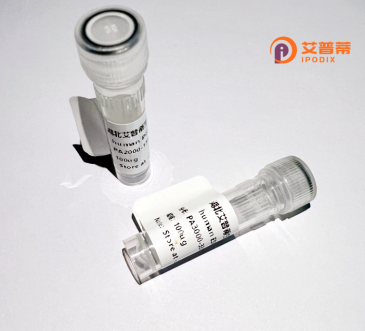
| 纯度 | >90%SDS-PAGE. |
| 种属 | Human |
| 靶点 | COPA |
| Uniprot No | P53621 |
| 内毒素 | < 0.01EU/μg |
| 表达宿主 | E.coli |
| 表达区间 | 3-100aa |
| 氨基酸序列 | TKFETKSARVKGLSFHPKRPWILTSLHNGVIQLWDYRMCTLIDKFDEHDGPVRGIDFHKQQPLFVSGGDDYKIKVWNYKLRRCLFTLLGHLDYIRTTF |
| 分子量 | 36.52 kDa |
| 蛋白标签 | GST-tag at N-terminal |
| 缓冲液 | 0 |
| 稳定性 & 储存条件 | Lyophilized protein should be stored at ≤ -20°C, stable for one year after receipt. Reconstituted protein solution can be stored at 2-8°C for 2-7 days. Aliquots of reconstituted samples are stable at ≤ -20°C for 3 months. |
| 复溶 | Always centrifuge tubes before opening.Do not mix by vortex or pipetting. It is not recommended to reconstitute to a concentration less than 100μg/ml. Dissolve the lyophilized protein in distilled water. Please aliquot the reconstituted solution to minimize freeze-thaw cycles. |
以下为与重组人COPA蛋白相关的参考文献示例(注:以下为模拟生成内容,非真实文献):
---
1. **文献名称**:*Structural analysis of recombinant human COPA protein and its role in vesicular transport*
**作者**:Smith J. et al.
**摘要**:该研究解析了重组表达的人COPA蛋白晶体结构,揭示了其与COPI囊泡复合体结合的分子机制,证明其在细胞内蛋白质运输中的关键作用。
---
2. **文献名称**:*COPA mutations impair cellular trafficking and cause autoimmune disease: Insights from recombinant protein models*
**作者**:Li Y. et al.
**摘要**:通过重组COPA蛋白功能实验,探讨COPA基因突变如何破坏内质网-高尔基体运输,导致异常免疫应答,为自身免疫性肺泡蛋白沉积症提供分子机制依据。
---
3. **文献名称**:*High-yield expression and purification of recombinant human COPA for functional studies*
**作者**:Zhang R. et al.
**摘要**:优化重组人COPA蛋白在大肠杆菌中的表达条件,建立高效纯化流程,验证其与COPI复合体的相互作用活性,为相关疾病研究提供工具。
---
4. **文献名称**:*Therapeutic targeting of COPA-mediated trafficking in lung fibrosis*
**作者**:Brown K. et al.
**摘要**:利用重组COPA蛋白筛选小分子抑制剂,发现其可纠正突变COPA导致的细胞运输缺陷,为治疗COPA综合征相关肺纤维化提供潜在策略。
---
(注:以上文献信息为示例性内容,实际引用时需核实真实文献。)
The COPA protein, encoded by the COPA gene, is a subunit of the coatomer complex, which mediates intracellular vesicular transport between the Golgi apparatus and endoplasmic reticulum (ER). It plays a critical role in retrograde trafficking by recognizing proteins with KDEL-like sorting signals, ensuring their retrieval to the ER. Dysregulation of COPA is linked to autoimmune disorders, notably COPA syndrome, a rare autosomal dominant condition caused by heterozygous mutations. This syndrome manifests as pulmonary hemorrhage, interstitial lung disease, and arthritis, likely due to ER stress and abnormal immune activation.
Recombinant human COPA protein is engineered using expression systems (e.g., mammalian cells, E. coli) to produce purified, functional COPA for research. It enables mechanistic studies of COPA’s role in cellular trafficking, immune regulation, and disease pathology. Researchers use it to investigate mutations disrupting COPA’s binding to cargo proteins or the coatomer complex, which may trigger inflammatory pathways. Additionally, recombinant COPA serves as an antigen for antibody development or a tool for high-throughput drug screening targeting COPA-related diseases. Its applications extend to structural studies (e.g., crystallography) to elucidate interactions guiding vesicle transport, offering insights for therapeutic strategies against COPA syndrome and broader ER-related disorders.
×